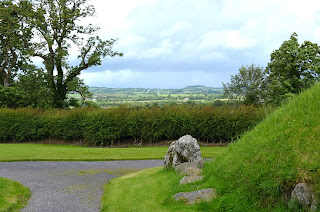Home is easy to
love. It’s home, known and familiar.
Usually coming home brings a little sigh of relief. Your feet know the shape of
the steps. Shabby or neat as a pin, its warmth wraps around you.
So how is it
that sometimes we go to someplace entirely new, completely alien, and foreign,
and from the first time our feet step onto the ground we feel we belong
there? This is not home, but in some inexplicable way this is your place,
too.
That’s how I
feel about Ireland.

I first started
to think about Ireland as a place, as somewhere that intrigued me, years ago,
when I was in college. I was drawn to
Irish writing, the medieval ballads as well as the writings of the Irish
scholars, learned men during a period when there were hardly any others in
Europe – the period we call (not entirely accurately) the Dark Ages. Then I discovered William Butler Yeats, and
fell in love.
Not long after
that, I married an Englishman and went to live in England. Unfortunately, it was just about that time
that what the Irish so characteristically call “the Troubles” began. It was the old Irish/English impasse all over
again: the Republicans, from the Irish Republic, in the overwhelming majority
Catholic, wanted Ireland as a whole to be free of English (now British)
domination. The people of North Ireland, overwhelmingly Protestant – many of
them descendants of the Scots Protestants that Cromwell and his successors
planted on the soil of northern Ireland, having first cleared away the Irish
Catholics who had owned the land before – wanted to remain part of Great
Britain. Using religion as a cudgel, both sides did their best to make the life
of the other side intolerable. Good men on both sides were killed; women and
children were blown up by omnipresent bombs.
I went right
off Ireland.
It wasn’t until
over twenty years of warfare made the population too weary to continue that an
uneasy peace settled, which gradually became less uneasy. The barricades came
down. The barbed wire was rolled and discarded. Belfast became almost an
ordinary city, no longer under continual siege.
And finally I
came to Ireland and lost my heart all over again.
What is it that
won me? Part of it was the history. Much of it is as ugly as the Troubles themselves.
The Irish were never a calm and peaceable people. The ancient history, muddled
with legend and myth, is full of fierce warriors, both men and women, and
brilliant tales of their beauty and bravery. The Irish fought each other before
they fought the English.
It’s been over
800 years since the English (mainly then the Normans, the new conquerors of
England itself) first set foot on Irish soil and made themselves at home. For
800 years the English have tried to make the Irish English, and for nearly the
whole of the 800 years the Irish have fought back. The Reformation added new fuel to the fire
after Henry VIII reformed the English church to become Protestant. The Irish by
and large chose to remain Catholic. The signs of their battles are all over the
country. Ireland is a land of ruins – beautiful ruins, many of them now,
weathered and sturdy even in decay.
More than that,
Ireland is a land of talk. Story-tellers of magnificent tales, true or not. The
same Irish who loved to fight are the Irish who now love to laugh and make wry
jokes about the state of their country. An Irish pub is a warm and welcoming
place, a window into the common life of the Irish people.
Ireland is green. No one could have guessed
that the good Lord had so many shades of green to spread around the rolling
hills and rocky plateaus of Ireland. There is good land to grow crops on and
much more stony, stubborn land to be conquered before it can be fruitful, but
all of it is green.
I came to
Ireland late, but when I came home to my cozy, familiar home, the distant
seductive sound of Irish music was still in my ears. I’ve been back since, and
I’ll be going again. And in the
meantime, part of my heart still lives there, and part of Ireland lives with
me.
- Beppie Harrison


